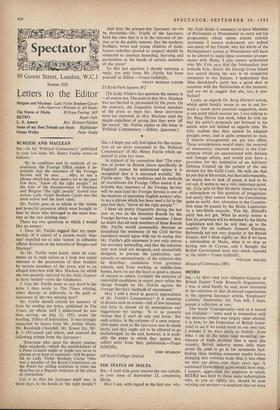Letters to the Editor
Burgess and Maclean Lady Violet Bonham Carter John Sparrow (Warden of All Souls) The Status ol Malta William Tee/mg, MP BETRO Roger Falk L. S. Amery Rev. Richard Feilden Some of my Best Friends are Scots Highlander Orson Welles Peter Noble
BURGESS AND MACLEAN
SIR,—In his Political Commentary' published in your last issue, Mr. Henry Fairlie writes as follows :
'By its traditions and its methods of re- cruitmcnt the Foreign Office makes it in- evitable that the members of the Foreign Service will be men . . . who, to use a phrase which has been used a lot in the past few days, "know all the right people." At the time of the disappearance of Maclean and Burgess "the right people" moved into action. Lady Violet Bonham Carter was the most active and the most open.'
Mr. Fairlie goes on to allude to the 'subtle and powerful pressures which were brought to bear by those who belonged to the same stra- tum as the two missing men.'
There are two questions to which I would like an answer : 1. Does Mr. Fairlie suggest that my mem- bership (i( it exists) of a certain social 'stra- tum' impelled me to take 'action' to influence official decisions in the interests of Burgess and Maclean?
As Mr. Fairlie must know, since he com- ments on it, such action as I took was solely relevant to the persecution of their families by certain members of the press, and to an alleged interview with Mrs. Maclean (in which she was quaintly reported by the Daily Express to have `smiled'—over the telephone).
2. Can Mr. Fairlie point to any word in the letter I then wrote to The Times relating, either directly or indirectly, to the guilt or innocence of the two missing men?
Mr. Fairlie should refresh his memory of facts by reading my letter, published in The Times, on whose staff I understand he was then serving, on July 21, 1952, under the heading, 'Ethics of Journalism.' It was strongly supported by letters from Mr. Arthur Mann, Mr. Randolph Churchill, Mr. Ernest Jay, Mr. R. J. O'Connell and others, and received the following tribute from the Spectator:
'Everyone who cares for decent journa- listic standards—which the establishment of a Press Council might or might not serve to elevate or at least to maintain—will be grate- ful to Lady Violet Bonham Carter (who was a member of the Royal Commission on the Press) for calling attention to what she describes as a flagrant violation of the ethics of journalism.'
Can it be that the Spectator itself was, in those days, in the hands of 'the right people'? And does the present-day Spectator, or—to be charitable—Mr. Fairlie of the Spectator, hold the view that it is in the interests of jus- tice, or in the public interest, that the mothers, brothers, wives and young children of male- factors (whether proved or suspect) should be subjected to constant hounding, harrying and persecution at the hands of certain members of the press?
To this last question I should welcome a reply, not only from Mr. Fairlie but from yourself as Editor.—Yours faithfully,
VIOLET BONHAM CARTER
21 Hyde Park Square, W2
[To Lady Violet's last question the answer is —of course not. The point is that Mrs. Maclean was not harried or persecuted by the press. On the contrary, she frequently invited members of the press to meet her; these interviews were not reported, as Mrs. Maclean used the simple expedient of saying that they were 'off the record.' Mr. Fairlie replies to this letter in 'Political Commentary.'—Editor, Spectator.]


































 Previous page
Previous page